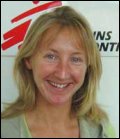Lamnian, Pakistani-Administered Kashmir:
Four days after the South Asian earthquake struck on October 8, Doctors Without Borders/Médecins Sans Frontières (MSF) nurse Chrissie McVeigh flew by helicopter from Islamabad to the village of Lamnian in Pakistan-administered Kashmir. She describes her work in the area, which has been almost completely destroyed.
|
-Chrissie McVeigh |

|
"There are two people who particularly stick in my mind. One is a small child–probably about two years old–who had horrific injuries. She had virtually been split in two, from her thigh to her buttocks. The wound was grossly infected. We sent her to the air base to be evacuated by helicopter, but there simply wasn't enough space for everyone on board. She had to wait two days before she could go, by which time the infection was even worse. It was awful. I don't know what happened to her–whether she survived or not.
The second is a woman with a broken arm. When I sat her down in a chair to start plastering it she burst into tears and just kept on sobbing. She had lost her entire family. Absolutely everyone. She just couldn't cope with the enormity of her loss–the fact that she has no family left. It is a huge thing here. I remember her especially because she's the only person I have seen so far openly expressing her emotion.
So many people have horrific injuries–there are children whose limbs have been completely crushed–their arms and legs are now just withered black flesh. All we can do for them is wrap them up and evacuate them to Islamabad for amputation.
There are also lots of serious spinal injuries. This is a rural area, where people work in the fields. It's just not somewhere you can be in a wheelchair. I keep thinking about how on earth they are going to manage from now on.
Shelter is the big thing now. It's so cold here. Yesterday a three-month-old child died of hypothermia. For the last two days there has been heavy rain, and snow up in the mountains. People are sleeping out in the open or just under pieces of corrugated iron and are really suffering from the cold. All they have are the clothes on their back and whatever they can salvage from the rubble–we've distributed all the blankets we have, but it's nowhere near enough yet. We're trying to get the cargo from Islamabad with more supplies, but the weather has been so bad over the last two days that it's impossible for the helicopters to fly.
The whole area has been completely demolished–I haven't seen one building still standing. There's just rubble everywhere. There's no electricity and water and the roads have all collapsed so there's no way to travel in or out by car. The health clinic that used to be here has completely collapsed, so we have had set up tents and a treatment area next to where it used to be.
Next door to us is what is left of a school, which collapsed with about 60 school children inside. They are still trying to get the bodies out. Astonishingly, a child was pulled out alive on Saturday – a week after the disaster happened. She only had an injured finger!"
An MSF team was setting up a maternal health clinic here when the earthquake hit. A Swedish nurse was trapped in the rubble for three hours. The team donated what medical materials they could salvage to the community, and then went to Islamabad to get more supplies.
When we arrived back here on Wednesday, people were very, very pleased to see us. Until then, there was just one army doctor and his assistant working here by themselves, trying to cope with about 300 patients each day. Two MSF doctors and myself are working hand in hand with two fantastic Pakistani surgeons, who happened to be in the region visiting their families when the earthquake struck. A lot of local people are also helping us in any way they can. It's amazing – even people who have lost half their family are here helping in the clinic. I find it extremely humbling -in western society we are very indulgent in our grief. These people just want to do what they can for anyone who survived. Local people come bring us walnuts and apples and keep asking if we are OK!
Patients just keep on arriving from the surrounding areas – they are carried down the mountain on planks of wood, stretchers made out of bits of trees, anything. There are many broken bones, huge lacerations and cuts and some terrible head injuries. I spend each day suturing, bandaging and plastering. We are now asking people to come back to the clinic to have wounds re-dressed, otherwise their injuries can become grossly infected and people could lose fingers and feet. We're running short on plaster of paris and antibiotics. I'm hoping the helicopter will make it tomorrow.
There are still lots of people in other areas waiting for help. When we flew out of Islamabad over the mountains I saw places completely demolished, with people waving up at the sky, trying to attract attention.
We're still getting quite a few aftershocks. Tonight there will probably be three or four. Every time, it's a traumatic reminder for people of what happened. Quite a lot of people come to the clinic with psychosomatic complaints – classic symptoms of post-traumatic stress. There will probably need to be significant psychological support for this.



